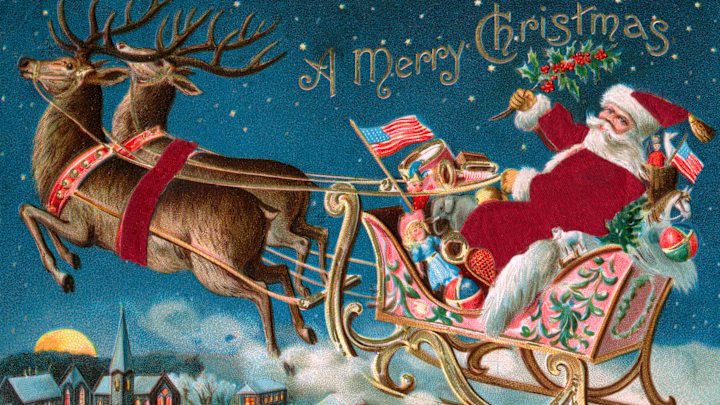Nog. Tidings. Wassail. Every time Christmas rolls around it brings with it its own vocabulary of words you barely hear the rest of the year. But while words derived from ancient English ales (like the nog in eggnog) and Middle English greetings (wassail is thought to derive from a Germanic phrase meaning “good health”) are one thing, some choice festive words—including the ones on this list—haven’t stood the test of time, and are basically unknown outside of the dustiest corners of the dictionary.
1. Ninguid

Ninguid, derived from Latin, refers to a landscape that’s snow-covered. And if that’s what your walk to work looks like over the festive period, you might also need to know that to meggle is to trudge laboriously through snow.
2. Peck-of-apples
This Lincolnshire word for a fall on ice is one to you’ll want to keep handy as you slip and slide around this holiday season.
3. Crump
That crunching sound you make walking on partially frozen snow is called “crumping.”
4. Hiemate
Hibernate is sleeping throughout the entire winter; hiemate is to spend winter somewhere.
5. Yuleshard
As another word for the festive period, Yule comes via Old English from jol, an ancient Scandinavian word for a series of end-of-year festivities. A yuleshard—also called a yule-jade (jade being an insult once upon a time)—is someone who leaves a lot of work still to be done on Christmas Eve night.
6. Yule-Hole

A yule-hole is the (usually makeshift) hole you need to move your belt to after you’ve eaten a massive meal.
7. Belly-Cheer
Dating from the 1500s, belly-cheer or belly-timber is a brilliantly evocative word for fine food or gluttonous eating.
8. and 9. Doniferous and Oblation
If you’re doniferous, then you’re carrying a present. The act of offering a present is called “oblation,” which originally was (and, in some contexts, still is) a religious term referring specifically to the presentation of money or donation of goods to the church. But since the 15th century it’s been used more loosely to refer to the action of offering or presenting any gift or donation, or, in particular, a gratuity.
10. and 11. Pourboire and Present-silver
Speaking of gratuities, a tip or donation of cash intended to be spent on drink is a pourboire—French, literally, for “for drink.” Money given in lieu of a gift, meanwhile, has been known as present-silver since the 1500s.
12. Toe-Cover

A cheap and totally useless present? In 1940s slang, that was a toe-cover.
13. Xenium
A gift given to a houseguest, or a gift given by a guest to their host, is called a “xenium.”
14. Scurryfunge
Probably distantly related to words like scour or scourge, scurryfunge first appeared in the late 18th century, with meanings of “to lash” or, depending on region, “to scour.” By the mid-1900s, however, things had changed: Perhaps in allusion to scrubbing or working hard enough to abrade a surface, scurryfunge came to mean “to hastily tidy a house” before unexpected company arrive.
15. Quaaltagh
Quaaltagh was actually borrowed into English in the 1800s from Manx, the Celtic-origin language spoken on the Isle of Man—a tiny island located halfway between Britain and Ireland in the Irish Sea. It was on the Isle of Man that festive tradition dictates that the identity of the first person you see (or the first to enter your house) on Christmas or New Year morning will have some bearing on the events of the year to come. And in Manx culture, the person you meet on that early-morning encounter is called the “quaaltagh.”
16. Lucky-Bird
We’re more likely to call them a “first-footer” these days, but according to old Yorkshire folklore, the first person across the threshold of your home on New Year’s morning is the lucky-bird. And just like the quaaltagh, tradition dictates that the identity of the lucky-bird has an important bearing on the success of the year to come: Men are the most fortuitous lucky-birds; depending on region, either dark-haired or light-haired men might be favored (but dark-haired is more common). Other regional variations claimed the man had to be a bachelor, had to bring a gift of coal (though by the 1880s whisky was increasingly popular), and/or had to have a high arch on the foot. People with a suitable combination for their region could “become almost professional,” according to the Leeds Mercury Weekly Supplement.
17. Apolausticism
Derived from the Greek word for “to enjoy,” apolausticism is a long-lost 19th-century word for a total devotion to enjoying yourself.
18. Hogamadog
According to the English Dialect Dictionary, hogamadog is another word for “The huge ball of snow” you get by “rolling a snowball over soft snow.”
19. Crapulence

Once all the festive dust and New Year confetti has settled, here’s a word for the morning after the night before: crapulence, as the Oxford English Dictionary puts it, is an 18th-century word for “sickness or indisposition resulting from excess in drinking or eating.”
A version of this story ran in 2018; it has been updated for 2023.
